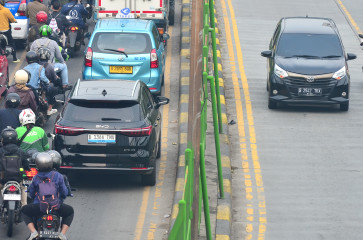Popular Reads
Top Results
Can't find what you're looking for?
View all search resultsPopular Reads
Top Results
Can't find what you're looking for?
View all search resultsLong way to go for prepaid to prevail
More than five years after introducing prepaid cards as a payment tool, major banks are still having a hard time expanding the cardâs penetration as card usage remains low
Change text size
Gift Premium Articles
to Anyone
M
ore than five years after introducing prepaid cards as a payment tool, major banks are still having a hard time expanding the card's penetration as card usage remains low.
Maikel Jefriando did not expect to be thought a fraudster when he handed out his prepaid bracelet issued by Bank Mandiri. The 25-year-old journalist meant to pay for his groceries using the bracelet at a minimarket in Cikini, Central Jakarta.
To his surprise, the cashier said that the minimarket did not accept such a payment tool, even though Mandiri's prepaid device was feasible at the counter, and accused Maikel of trying to commit fraud.
'I tried explaining the bracelet's function and asked her to try tapping it on the device, but she wouldn't budge. So I left because I didn't have any cash,' he said.
Aisyah Nuraini, not her real name, experienced the same rejection as Maikel at another minimarket in Medan, North Sumatra. Out of cash, she took out her Flazz card issued by Bank Central Asia (BCA).
'But the cashier told me to use cash instead. She said that the prepaid device had never been used at all since it was installed,' Aisyah said.
Maikel's and Aisyah's experiences show that transformation into a non-cash society still has a long way to go, a fact that both banks and regulator acknowledge.
Mandiri senior executive vice president for transaction banking Rico Usthavia Frans said that the number of its prepaid card'including those in the form of bracelet'had only reached 4.5 million since it was first introduced in 2009.
'It is not easy to get people to grow accustomed to a non-cash payment tool, even though we carry out an awareness program about it to our merchant partners. It's a matter of education and habit,' he said.
At the moment, the majority of Mandiri's prepaid card transactions occur in Jakarta, such as at tollgates, electric commuter train stations and Transjakarta bus shelters.
Only a fraction of the transactions occur at minimarkets, namely Indomaret and Alfamart, and at other retail outlets.
Rico claimed that the bank conducted regular training for its merchant partners about the use of the prepaid card and device, but attributed Maikel's mishap to high employee turnover at the partners' outlets.
He added that if prepaid-card use were to be compulsory at various outlets, both transaction amount and value would spike.
According to data from Bank Indonesia (BI), there are currently seven banks that offer prepaid cards as a payment tool. Besides Mandiri and BCA, there are also Bank Negara Indonesia (BNI), Bank Rakyat Indonesia (BRI), Bank Mega, Bank DKI Jakarta and NobuBank.
The total number of cards is predicted to hover at between 13 million and 14 million.
Combined with other electronic payment tools, such as mobile-based electronic money, total transaction value stood at Rp 2.52 trillion (US$207.55 million) as of September, up 16.3 percent from the same period in 2013.
Meanwhile, with 6.5 million cards circulating, BCA now has the largest share in the prepaid card market. However, Mira Wibowo, BCA's marketing consumer card group head, said that education proved to be somewhat of a challenge when the lender tried to expand outside Jakarta.
'It's a nonstop challenge,' she said.
Director of BI's policy and payment system supervision department, Farida Peranginangin, agreed with Rico, saying that the government's national non-cash movement (GNNT) would reach higher effectiveness if non-cash tools became compulsory, as in the case of the Greater Jakarta commuter line.
'Some other sectors must be opened up to prepaid cards, but it depends on the audacity of the organizing companies as well to promote the card's use,' she said.
Separately, Association of Indonesian Retailers (Aprindo) executive director Tutum Rahanta said that its members had actually embraced prepaid cards, but demanded that both retailers and banks sit together to improve the use.










